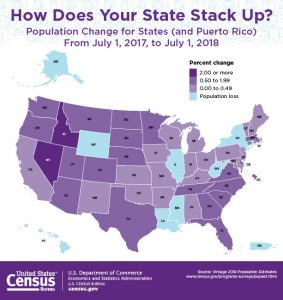New Jersey Future Blog
New Population Estimates: New Jersey’s Still Growing, But Slowly
January 2nd, 2019 by Tim Evans
 The Bureau of the Census released new annual estimates of state populations in mid-December. A quick analysis shows that New Jersey’s story continues to be one of slow growth. The state’s year-to-year growth of 0.22 percent from 2017 to 2018 is actually the fastest single-year growth rate since 2010-2011, when it grew by 0.41 percent. It shares this distinction with neighbor Delaware (which also posted its fastest growth since 2011 this year) but not with any other Northeastern state, all of which had at least one faster year of growth at some point since 2011.
The Bureau of the Census released new annual estimates of state populations in mid-December. A quick analysis shows that New Jersey’s story continues to be one of slow growth. The state’s year-to-year growth of 0.22 percent from 2017 to 2018 is actually the fastest single-year growth rate since 2010-2011, when it grew by 0.41 percent. It shares this distinction with neighbor Delaware (which also posted its fastest growth since 2011 this year) but not with any other Northeastern state, all of which had at least one faster year of growth at some point since 2011.
While New Jersey grew between 2017 and 2018, a few of its neighbors actually lost population. The nine states whose populations declined over the last year are West Virginia (with the fastest decline, at -0.62 percent), Illinois (-0.35 percent), Alaska (-0.32 percent), Hawaii (-0.26 percent), New York (-0.25 percent), Louisiana (-0.23 percent), Wyoming (-0.21 percent), Mississippi (-0.10 percent), and Connecticut (-0.03 percent). In addition, six other states — Kansas, Rhode Island, New Mexico, Pennsylvania, Michigan, and Ohio — had positive growth rates that were slower than New Jersey’s, leaving New Jersey ranking 35th among the 50 states for percent growth rate from 2017 to 2018.
In terms of growth rate for the entire decade so far (from 2010 to 2018), New Jersey ranks 39th, with a growth rate of 1.33 percent. This puts it ahead of three states — West Virginia, Illinois, and Connecticut — that have lost population since 2010 and eight more — Ohio, Michigan, New York, Pennsylvania, Maine, Mississippi, Rhode Island, and Vermont — that have grown more slowly. New Jersey appears to be on track to fall well short of its growth rate in the 2000s; it grew by 4.3 percent from 2000 to 2010. But most of the rest of the slow-growth states have grown more slowly this decade than last decade, too — New Jersey only ranked 37th in the 2000s. Almost all of the states that were below it on the list for the 2000s are also below it so far on the list for the 2010s.
New Jersey is not in any immediate danger of surrendering its title as the country’s most densely populated state. In fact, New Jersey has now crested the 1,200 mark as of this year, with a 2018 density of 1,200.8 people per square mile (up slightly from 1,198.1 in 2017). Its nearest competitor, Rhode Island, is only at 1,011.8 people per square mile and actually lost ground on New Jersey, thanks to a slower annual growth rate. No other state has 1,000 people per square mile or more; third-place Massachusetts is at 880.6 people per square mile as of 2018.
As in prior years, New Jersey’s population continues to grow thanks largely to international immigrants. Between 2017 and 2018, New Jersey lost a net of 50,591 residents to out-migration to other states, an outflow that far exceeds the natural increase (births minus deaths) of 23,856 over the same period. A gain of 46,660 from international immigration was nearly enough to cancel out New Jersey’s losses to other states and, combined with the natural increase, was enough to keep New Jersey’s growth in the black, with a total numerical gain of just under 20,000 from 2017.
New Jersey’s net domestic outflow of residents to other states was the fourth largest among the 50 states. New York ranked first, losing a net 180,000 residents through out-migration to other states. California — no longer a dominant internal destination for state-to-state movers — was second, with a net loss of 156,000 domestic migrants. Illinois ranked third, with a net outflow of 114,000. New Jersey’s net outflow was twice the size of that of Massachusetts (-25,755), Maryland (-24,518), Connecticut (-21,509), or Pennsylvania (-20,463).

















Hi Tim,
Is NJ likely to lose another seat in Congress after the upcoming census?
Thanks,
Tom Wells, TNC
Tom — It sounds like NJ is not on track to lose a seat. Election Data Services has done what looks to me like a pretty thorough analysis, and none of their scenarios include NJ losing a seat: https://www.electiondataservices.com/wp-content/uploads/2018/12/NR_Appor18wTablesMaps-20181219.pdf